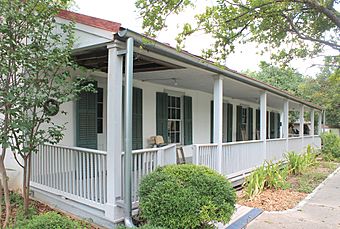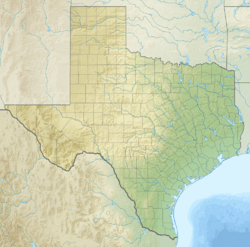Yturri–Edmunds Historic Site facts for kids
|
Yturri–Edmunds Historic Site
|
|

Yturri–Edmunds House
|
|
| Location | 128 Mission Road (Yellostone at Mission) Bexar County, Texas |
|---|---|
| NRHP reference No. | 96000870 |
Quick facts for kids Significant dates |
|
| Added to NRHP | August 8, 1996 |
The Yturri–Edmunds Historic Site is a special place in San Antonio, Texas. It's like a time capsule showing how people lived long ago. The main house is recognized on the National Register of Historic Places, which means it's an important historical building in the United States. The entire property, including the house and a mill, was also named a Recorded Texas Historic Landmark in 1966.
Contents
The Yturri–Edmunds Story
Early Beginnings in the 1800s
The story of this site began in the early 1800s. At that time, Mexico had a law called the General Colonization Law. This law allowed people to get land grants, which were official permissions to own land. Manuel Yturri de Castillo received one of these land grants. His new property was once part of Mission Concepcion, an old Spanish mission.
Manuel Yturri de Castillo was born in Spain. He later moved to Mexico and worked for Spanish merchants. These merchants eventually sent him to San Antonio. In 1821, he married Maria Josefa Rodriguez. Her family were among the first Canary Islanders to arrive in the area back in 1731. Canary Islanders were people from the Canary Islands, a Spanish territory, who moved to Texas to help settle the region.
Passing Down Through Generations
When Manuel Yturri de Castillo passed away, his land went to his family. Many years later, his granddaughter, Ernestine Edmunds, decided to give the historic property to the San Antonio Conservation Society (SACS). This society works to protect historic places. SACS officially took ownership of the site in 1961.
Exploring the Historic Site
The Adobe House
The main house at the site is made of adobe-blocks. Adobe is a natural building material made from earth, water, and straw. It's a very old way of building homes. Experts believe Manuel Yturri de Castillo built this house between 1840 and 1860. In 1996, the house was added to the National Register of Historic Places.
The San Antonio Conservation Society started a big project to fix up the house in 1964. They made many repairs, rebuilt the porch, re-plastered the walls, and restored the inside of the house completely.
The Grist Mill and Other Buildings
The site also has a working grist mill. A grist mill is a machine that grinds grain, like corn or wheat, into flour. It's thought that this mill was already there when Yturri de Castillo bought the property. In 1964, experts Ernst Schuchard and Marvin Eickenroht helped restore the mill. Today, it can still operate!
Two other historic buildings were moved to the Yturri–Edmunds site to preserve them. In 1964, an old two-story carriage house from 1881 was bought by SACS and moved here. Later, in 1984, a home made of caliche (a type of rock) and stone, built by Cristof Postert, was also moved to the site.
Visiting the Site
Today, the San Antonio Conservation Society runs the Yturri–Edmunds Historic Site as a museum. You can visit by making an appointment. There is an admission fee to help maintain the site. If you give them two weeks' notice, you can even see the grist mill in action! It's a great way to see how people lived and worked in Texas many years ago.



